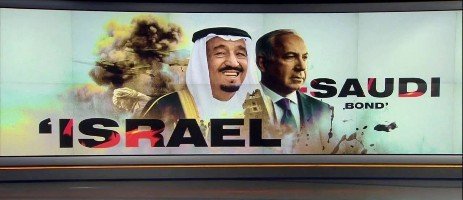
Two major American horrors
("Israel" and Saudi "Arabia")
The two "strategic panics/horrors" affecting the future of US policies in the region are: the fate of Israel and the fate of the Saudi government.
To overcome these two horrors, Washington has no effective options.
Financial strength, military power and the power of coalition, can not end these two strategic horrors. That's why America, at this time, more than ever, relies upon political propaganda and psychological operations around the "effective US power" axis. In fact, this is the only option America has.
1- Until four decades ago, our region ["Middle-East"], except for a few exceptions, was under US political, military, economic and security domination, ... it was enough for the American ambassador to be after something. If it was day, before nightfall, and if it was night, before morning, the task would have been realized, even if it was a change of government. The head of the office of Mohammad Reza Pahlavi [the Shah] quotes; One day, Mohammad Reza sat down on a simple chair facing me. And, when I asked him what is bothering him, he replied that the American ambassador has told me to go from Iran!
Now, the situation in our region is such that, only a few areas remain under absolute domination of the United States: Saudi Arabia, Israel, and the United Arab Emirates. And, this is under circumstances that we doubt as to whether Washington is capable of preventing a government crash or bringing to power a new government in Riyadh.
2. The main authority of the United States in the region was its military strength. This power was effective between 1949 and 1979 - post World War II, until the victory of the Islamic Revolution - and able to project the power of the United States in a "sinister way." ... Today, this costly military chain has lost its former function. The successive success of US rivals and opponents in the region in civilian and military conflicts with the United States is the main reason for the crash of this leverage. ...
In addition, in terms of strategy and tactics, American military power has faced a major challenge. ... Today, even the military situation in the United States is severely threatened, so far as the US military command in Afghanistan, which basically was launched under the slogan of "Tackling the Taliban," is negotiating with them, who actually controls only 25% of Afghanistan. ... limited to several bases in Bagram and so on! And, in Iraq, United States, in spite of having more than 300,000 military and intelligence forces, was forced to plead with General Suleimani to allow US troops to return from Iraq, based on the 2007 Security Agreement, without casualties.
Today, the US Army and the Pentagon assessment is that, US maritime and aeronautical weapons, especially gigantic warplanes such as aircraft carriers, rather than be an asset against its rivals are a hindrance. A Pentagon research official recently revealed that the life of the US Navy fleet is between 40 and 80 years, an average of 65 years. He described his estimation as follows: "Aircraft carriers, which are considered to be the most expensive military equipment, are costly, costing $ 2.1 billion a year, while at a low cost, the ships can be attacked and sent to the bottom of the sea, by opponents. ...
3. The existential philosophy of Israel, according to Golda Meir's formal statement, was to protect the interests of the West in Asia and expand it. Balfour, an influential British official in the establishment of the Zionist regime, also made it clear that Israel is our foothold in Asia against the opposition. Today, however, the image of Europeans and Americans from Israel does not correspond to the idea at all. Israel is no longer the western frontier, and has failed to help the West in its bid, in the wake of the Syrian crisis, which was intended to remove President Assad from power, as a strategic point in the Resistance front. ...
Israel needs protection policies today, and this shows that Israel is no longer an "invader", and it's limited to bombing residential areas in the Gaza Strip area or a cargo or ghost shipments in Syria. Israel is now thinking of a wall mounted on the sea, which means that it is exposing itself to a sea bay and considers its naval warfare to be inadequate.
America knows that Israel is in danger of collapse. The residents of the northern [Occupied] Palestinian territories, now between Haifa and the borders of Lebanon and Syria, are now refusing to continue living in their homes and go down to Haifa. Civilian populations in Syndari, Safd, Kiryat, Shemmoun... are displaced turning them into ghost towns. ... Haifa has now just over a million people, and small military threats have pushed its inhabitants to the lower regions, especially to the capital, forming Israel's largest social and security crisis. The United States is horrified by this situation, as preserving Israel is a "red line" in U.S. strategy, but, now, America does not deem itself capable of this.
4. The Saudi regime has, also, now become a major concern for the United States. ... The West defeated the Ottoman Empire in the Arab section with the help of Saudis. With the help of Saudi Arabia, it established the Zionist regime. With the help of Saudis, financial crises have been resolved. With the help of Saudis, it eliminated its opponents in the West and East Asia. With the help of Saudis, it formed a mediocre front against Iran, in the region. During these 85 years, Riyadh has paid the cost of Western and Israeli hostilities against the people of the region.
In the Nixon period, the Americans spoke openly of Saudi Arabia as a financial "pillar" of their foreign policy, and a few years ago, Henry Kissinger spoke of Saudi officials as "our" warehouse guards.
But now, the United States is very skeptical about the survival of the regime, with Saudis characteristics. The United States in relation to Saudi Arabia faces a paradox and a conflict. On the one hand, the tribal, dictatorial, family and traditional Saudi administration is considered to be the decisive factor in the transition to a government in the near future, and on the other hand, the Saudi political context constitutes a barrier to "peaceful change." Thus, Washington is fearful of change in Saudi Arabia.
After the death of Abdullah, the United States is trying to test the capacity of Saudi Arabia in terms of a managed change. Rapid and unprecedented changes in the cadre and leadership, and the abandonment of family traditions from sensitive posts, widespread arrest of the princes, and most importantly the bringing of a young person without experience and previous history were all actually a test. But the isolation of Mohammad bin Salman, in last two to three months, and the return of Salman bin Abdul Aziz to the State apparatus, shows that the test has not had good results. ... The shooting at the Palace is just one such sign.
The United States, knows precisely that the decade ahead, in West Asia, is a decade for self-determination. And that the old mechanisms and foundations left over of the First and second World Wars, and the Cold War era relationships do not work in today's world. Now, rivals, without having vast outdated American facilities, can fly light and fill-in for America and its few remaining dependent regimes, determining their own fate.

Congratulations @faramak! You received a personal award!
You can view your badges on your Steem Board and compare to others on the Steem Ranking
Do not miss the last post from @steemitboard:
Vote for @Steemitboard as a witness to get one more award and increased upvotes!